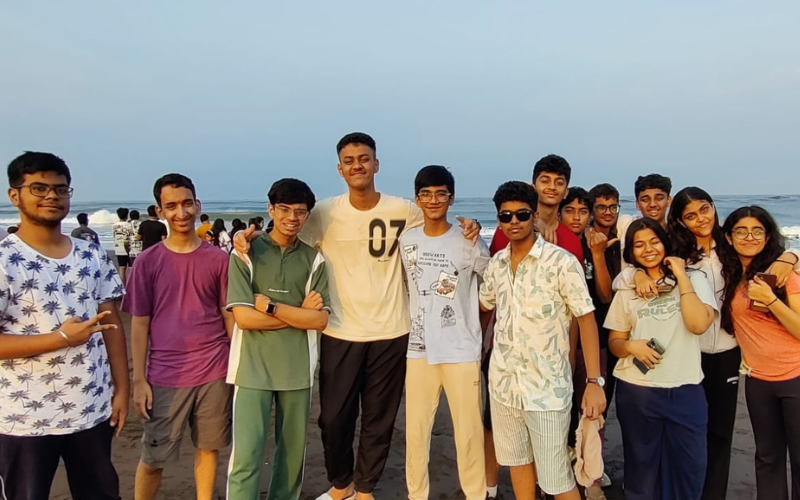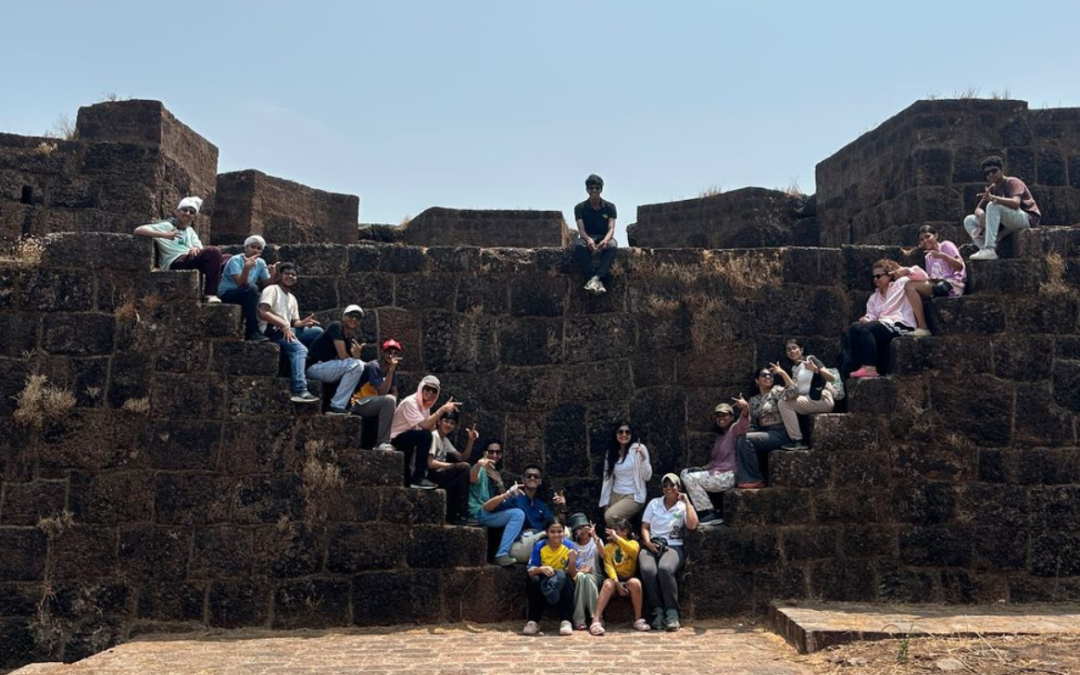By Kapish Sharma, The Universal School Ghatkopar
Waves at my ankles, stars in my eyes: my Velas story
My first trip without my parents
Friday night, under the dark city sky, I boarded the bus that would take us to Velas. The city still buzzed behind us — honks, blinking advertisements, conversations spilling onto the street — but inside the bus, it was a different world. Teachers called out names, friends shuffled into seats, and bags thudded softly against the floor.
It was my first trip without my parents. Excitement fluttered inside me — a strange freedom wrapped in a layer of nervousness.
As the bus pulled away, the city lights smeared into streaks against the windows. My friends broke into songs, dancing and laughing down the narrow aisle, their voices rising and falling with the rhythm of the road.
But I found myself sliding into a seat near my teacher, plugging in my earphones, retreating into my music.
Outside, the dark trees flashed past, and the roads stretched endlessly into the night.
Inside, I was half-asleep, the hum of the bus merging with my songs — floating somewhere between dreams and anticipation.
Velas team

Velas
The journey lasted about six hours — a blur of half-conscious moments — until the first soft grey light of dawn crept into the sky.
When we reached Velas, the air hit me first: salty, earthy, thick with the breath of the sea and the land.
The village was small — narrow streets, simple houses, old trees standing still like ancient watchers. There was a patience in the way Velas existed, a kind of quiet pride.
Our homestay was humble — wooden shutters, cool floors, open spaces.
The hosts welcomed us with warm smiles and tiny mangoes, gifted to us since it was our first time there.
It was not luxury, but something deeper: belonging.
Breakfast was simple ghavan with coconut chutney — soft, light, and comforting.
The sounds around me were strange but soothing: birds singing boldly, waves whispering beyond the trees, and leaves gossiping with the breeze.
I was just there
Later that morning, we walked to the beach.
The sand was soft and cool under my feet. The sea stretched out endlessly, and the sun spilled through the clouds in golden, broken beams.
There was no wind — the whole beach felt like it was holding its breath.
I stepped into the water, letting the waves touch my ankles, and just stood there.
Wave after wave came and went — tugging gently at my skin, like the sea was trying to remind me of something ancient and kind.
I closed my eyes and breathed.
In that moment, I wasn’t anyone or anywhere in particular.
I was just there, calm and free, stitched into the world by the rhythm of the sea.
Then came one of the most magical moments: the turtle hatchlings.
Tiny, determined, newly born — already struggling their way toward the massive, indifferent ocean.
It struck me then, quietly and powerfully — life begins with struggle, even for the smallest among us.
The miracle of space above us
Lunch that day was warm and hearty: soft chapatis with methi subzi, chana matar, tangy pickles, and cool solkadhi to beat the heat.
The food here didn’t just fill you; it wrapped around you like an old story you hadn’t heard in years.
The fort hike in the evening was no less magical.
The stones were rough and warm, and the grass brushed against my legs as we climbed.
From the top, Velas unfolded below us — green, golden, and infinite.
I wanted to freeze it — the slow breathing of the land, the way the sky brushed the hills, the smell of the salt air.
Night fell like a soft blanket.
The stars exploded across the sky, brighter and closer than I had ever seen them.
We walked under them, laughing sometimes, silent sometimes, but mostly just breathing in the cool air and the miracle of space above us.
Dinner was handi subzi, dal-chawal, salad, and the perfect sweet ending: warm ukadiche modak.
Sleep came easily — the kind of sleep only peace can give.
The night walk in Velas was an unforgettable experience, especially as we gazed up at the vast, clear sky. With no city lights to interfere, the stars seemed closer, more alive. We could see Mars shining brightly, its reddish hue standing out against the deep blackness of the night. The constellations Cancer, Leo, Gemini, and others were clearly visible, their patterns telling stories that have been passed down through the ages. As we stood there, with the cool evening air around us, it felt like time slowed down. The stars above, so steady and constant, were a beautiful reminder of the larger universe we’re all a part of. It was a humbling experience that left me in awe, feeling connected to something far beyond myself.
It was a reminder
The next morning started with fluffy poha, and our final lunch was pithla bhakri — smoky, rustic, full of the flavors of old kitchens and slower times.
When it was time to leave, the village seemed to sigh around us, heavy with things left unsaid.
The return bus journey was quieter.
This time, I didn’t put my earphones in.
Instead, I sat beside my teacher, and we talked — about the trip, about life, about how the world moves so fast we forget how to simply be.
At one point, she looked out the window at the trees blurring past and said, almost to herself:
« It’s sad that we pay to feel grounded for a day. »
Her words stayed with me.
Sad that stillness — belonging, rootedness — had become something rare, a luxury instead of a birthright.
Outside the bus window, mango trees and coconut palms waved quietly, like old friends saying goodbye.
Inside, I wasn’t sad exactly — just thoughtful.
It was a feeling too big for sadness, too gentle for happiness — something deeper, something that wrapped itself around the edges of my heart.
I kept thinking about the mango tree and the coconut tree.
About the hatchlings, the fort, the stars, the mini mangoes, the songs I didn’t sing, and the moments I tried to memorise before they dissolved into memory.
Velas wasn’t just a trip.
It was a reminder — that in a world that rushes past us, there are still corners where the earth hums, where the sea breathes, and where you can find yourself standing still, quietly listening to your own heart.




